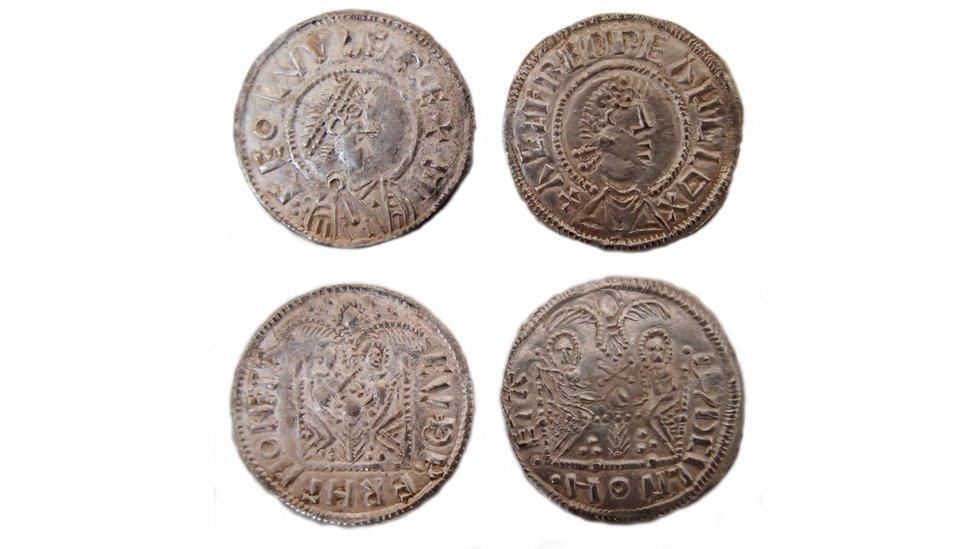Men selling Anglo-Saxon haul arrested in sting, court told
- Published

Police previously said the recovered coins were similar to these four from the British Museum
Two men trying to sell historically significant Anglo-Saxon coins worth more than £750,000 were arrested in a police sting, a court has heard.
Roger Pilling, 73, of Loveclough, Lancashire, and Craig Best, 44, of Bishop Auckland, County Durham, deny conspiring to convert criminal property between September 2018 and May 2019.
Durham Crown Court heard Mr Best was arrested at a Durham hotel in May 2019 following an undercover operation.
Mr Pilling was then arrested at home.
It is believed the coins were produced between AD874 and 879 and later buried by a Viking.
The haul included two extremely rare examples of two-headed coins bearing images of both Alfred of Wessex and Ceolwulf, a figure who was discredited by Saxon writers as a Viking puppet ruler.
Prosecutor Matthew Donkin told the jury they would hear from an expert at the British Museum who believed "the coins in this case are extremely significant for our understanding of the history of the unification of England".
The court was told the coins were believed to be part of the Herefordshire Hoard - a multimillion-pound haul found by two detectorists in 2015 who did not declare the find as "treasure" and instead sold items to dealers.
Mr Best took three coins to a meeting at the Royal County Hotel with undercover officers he thought were part of a team brokering a deal with a US-based buyer, the jury heard.
The trio of coins included one of the exceptionally two-emperor style Alfred and Ceolwulf examples - which itself was worth £70,000.
Uniformed officers then arrested Mr Best and a subsequent raid of Mr Pilling's home recovered a further 41 coins, Mr Donkin said.
Jurors heard an image from Mr Pilling's home showed 46 coins in total, meaning two remained missing.
The court was told that in 2018 Mr Best had made contact with US-based Prof Ronald Bude, who had a passion for ancient coins, and tried to interest him in buying some including an "Alfred penny".
Unsure if they were real, the academic contacted a UK-based expert and, as word got around about the extremely rare coins, the authorities were alerted and the undercover operation mounted.
The defendants also deny possessing criminal property.
The trial continues.

Follow BBC North East & Cumbria on Twitter, external, Facebook, external and Instagram, external. Send your story ideas to northeastandcumbria@bbc.co.uk, external.